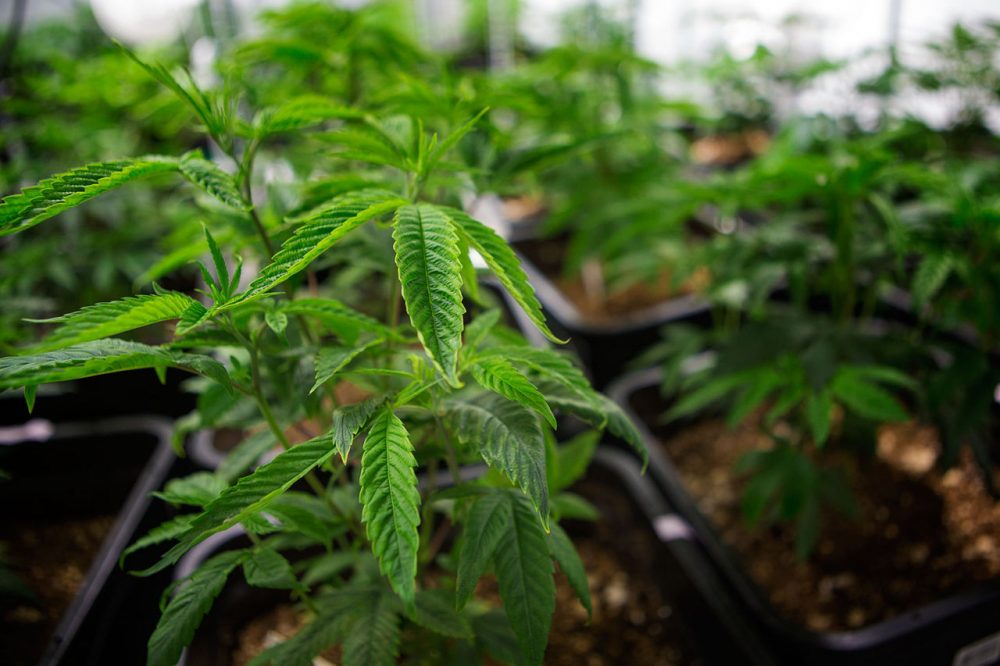Advertisement
Mass. High Court Tackles Driving Under The Influence Of Marijuana

It was just after midnight in February 2013 when a state trooper in Millbury noticed a car ahead with no rear lights. The trooper pulled over Thomas Gerhardt, approached the car, and smelled marijuana.
Gerhardt failed two of the standard field sobriety tests. He could not stand on one leg for 30 seconds. When asked to walk a line test, Gerhardt needed a couple of explanations and then didn’t stop and turn around after the suggested nine steps. Gerhardt was able to count backwards and recite a portion of the alphabet.
So, based on those tests, was Gerhardt too impaired to drive? That's one of the questions the Massachusetts Supreme Judicial Court is reviewing in The Commonwealth v. Thomas J. Gerhardt. It's the first marijuana OUI case to reach the highest court since weed became legal for recreational use in Massachusetts late last year.
In a hearing on Friday, Gerhardt's attorney, Rebecca Jacobstein, acknowledged that marijuana users often can't balance on one leg. But she told the justices that failing roadside tests does not mean a driver is too impaired to drive safely.
"In marijuana cases, there’s just no correlation, because field sobriety tests don’t test for driving impairment," Jacobstein told a panel of five justices.
Expertise And Field Sobriety Tests
Field sobriety tests gauge coordination, concentration and reaction times. In a case of suspected drunk driving, police combine those tests with a breathalyzer and other observations to make the argument that a motorist is impaired. But there is no breathalyzer type test for weed. So in Gerhardt’s case, the prosecution would rely on the police officer to tell a jury that Gerhardt failed two roadside tests and that he was too impaired to drive.
Jacobstein says many police officers do not have the expertise to offer that testimony. She says judges must require an expert witness in marijuana OUI cases to explain the science of marijuana impairment to jurors.
"If you wanted to make a bright line," Jacobstein said, "I think the bright line would just be that you have to have an expert to correlate these things until enough of society understands how marijuana’s impacted and isn’t."
Some justices seemed to think requiring an expert to explain the impairment of every driver was going too far.
Advertisement
"What if he stumbles and he says, 'Oh my goodness, I just had five joints.' Do you need an expert?" Justice David Lowy asked. "You still do," Jacobstein replied.
A lower court agreed, saying that there’s no firm science yet on how marijuana affects driving and at what dose. But Worcester Assistant District Attorney Michelle King pointed to four new studies that she said show a connection between roadside tests and marijuana impaired driving.
"This is a field that is vastly developing," King told the justices. "Just in the two year period between the time when the hearing was held in the lower court [and today], the field has significantly changed."
Researchers Catching Up To Legal Marijuana
King said police should be able to present field sobriety tests as evidence and offer their own opinions on whether the tests show a driver is impaired. Associate Justice Geraldine Hines interrupted King with a question.
"Science has verified the tests for alcohol. We’re starting from the beginning here," Hines said. "I’m just puzzled at how police officers are going to be able to testify to something that the science hasn’t verified."
King told Hines that "at this point, science has indeed verified that marijuana ingestion or consumption does in fact correlate to poor performance on field sobriety tests."
Hines shook her head. "Well, that’s what you say, but the findings that we have in front of us don’t say that," she said.
Researchers looking at marijuana’s effects on the brain, especially while driving, are trying to catch up as marijuana becomes legal for medical and recreational use in an increasing number of states. In the meantime, there’s confusion among many people about whether it’s safe to use marijuana at all and then drive, or how long you have to wait after ingesting weed. And King says those in law enforcement aren’t sure what to do.
"It’s a frustration for everyone, I think, trying to figure out which tests will be admissible," King said. "So you have judges across the commonwealth who are just coming down in different ways because they don’t have any guidance yet. And I think this decision is going to provide them much needed guidance, one way of the other."
There’s no indication how soon the state’s highest court will issue a ruling that may offer that guidance.
This segment aired on January 6, 2017.
